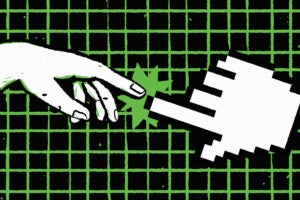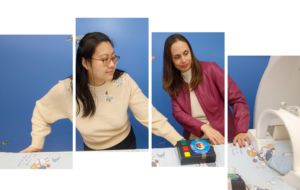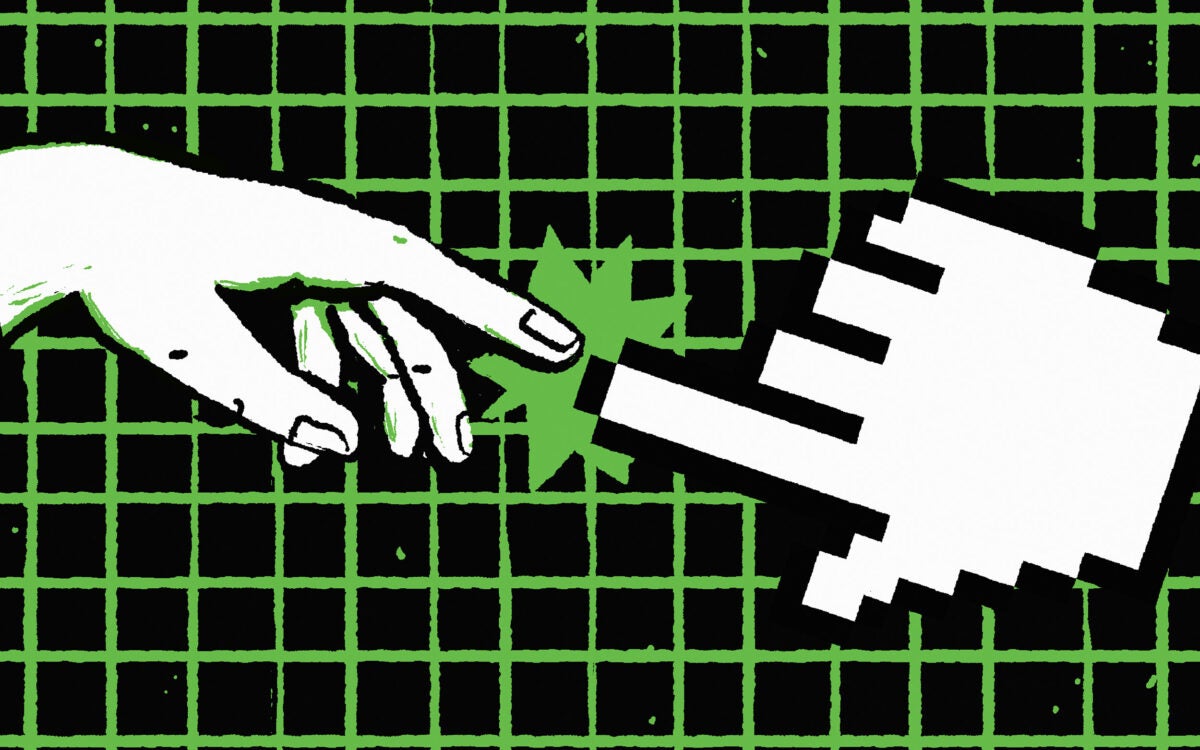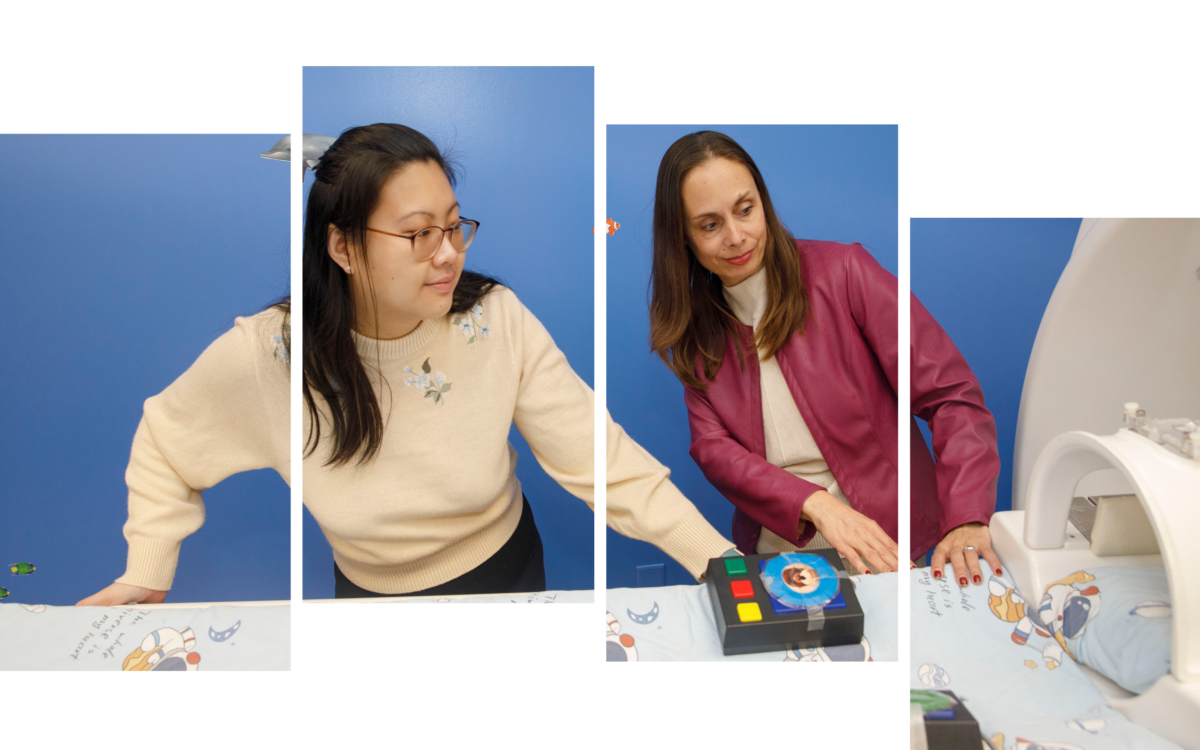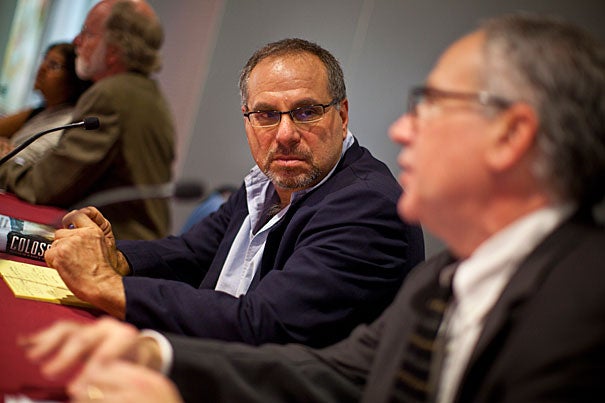
Bruce Gellerman (left), host of the public radio program “Living on Earth,” joined Graduate School of Arts and Sciences Dean Allan Brandt on a panel to discuss science’s seeming inability to stand toe-to-toe with corporate interests over issues of fact when dollars are at stake.
Justin Ide/Harvard Staff Photographer
Doubting Thomas nation
Panelists examine why science can fail to persuade
It’s like the tobacco wars all over again.
Science’s seeming inability to stand toe-to-toe with corporate interests over issues of fact when dollars are at stake has a history in this country, panelists at the Harvard Museum of Natural History said Wednesday night (Sept. 29).
Though scientific evidence of human-caused climate change has accumulated to the point that there is wide consensus among scientists, well-funded, industry-backed organizations have succeeded in sowing doubt among lawmakers and the public, panelists said. The result is debate instead of action that might hurt corporate bottom lines.
Panelists drew parallels with the decades-long battle against tobacco and other instances of scientific uncertainty and corporate resistance, such as the debate over burying nuclear waste under Nevada’s Yucca Mountain and automakers’ resistance to equipping all cars with seat belts. Despite clear evidence and scientific consensus that smoking causes lung cancer and a host of other ills, such as heart disease, stroke, and chronic obstructive lung disease, tobacco companies mounted a vigorous defense of their product for decades, through advertising, by questioning scientific findings, and by countering them with studies funded with industry money.
Tobacco “was recognized as a human health hazard, but it was extraordinarily difficult to get any restrictions,” said James McCarthy, Alexander Agassiz Professor of Biological Oceanography. “We have a similar situation with respect to climate science.”
McCarthy was joined on the panel by Sheila Jasanoff, Pforzheimer Professor of Science and Technology Studies and professor of environmental science and public policy at Harvard Kennedy School, and by Bruce Gellerman, host of the public radio program “Living on Earth.” The panel was moderated by Dean Allan Brandt of the Graduate School of Arts and Sciences, who is also the Amalie Moses Kass Professor of the History of Medicine at Harvard Medical School and a history of science professor in the Faculty of Arts and Sciences.
Brandt, author of the book “The Cigarette Century,” compared climate change not only to tobacco but also to early efforts to curb cholera. Though 19th century physician John Snow was convinced that cholera was borne in the water — something we now know to be true — microscopes of the time couldn’t detect anything unusual. Despite the uncertainty, Snow convinced local officials to remove the handle from a water pump, effectively ending an epidemic that killed 616 people.
“The questions before us are among the most important in global science and policy,” Brandt said. “How much do we need to know from a scientific perspective in order to act?”
McCarthy said that much of the uncertainty in projecting the impact of climate change is related not to nature, but to humans. Questions remain about how many people the Earth will support in the coming decades, about what their standard of living will be, and about what fuels they will use, he said.
McCarthy said the culture of scientists sometimes adds to the perception problem, clashing with the treatment of uncertainty that is common in politics and public policy. For a scientist, he said, uncertainty is something at the center of their efforts. Scientists routinely consider what they don’t know and incorporate that into their presentations of what is known as an avenue of future work. In the public arena, discussions of uncertainty can be seen not to highlight future areas of concern, but rather to undermine what is known.
But industry is not always the bad guy, Jasanoff said. She pointed out that business finances much useful research too, and in fact there have been efforts to forge closer ties between industry and academia as a way to bring useful innovations to market. Jasanoff said there may be structural reasons in America why many people are prone to such doubts about scientific findings. In Germany, she said, greater efforts are made to bring science to bear on policy, and the result is fewer such divisive debates.
Jasanoff said the tolerance for scientific doubt in the policy arena is relatively new. Before the 1950s, the American system of common laws required certainty of harm before legal action could be taken.
Pollution, she said, not just had be present in a waterway before it could be stopped, but harm from that pollution had to be imminent. With growing environmental awareness in the 1960s, society became more comfortable with the idea of acting before harm was apparent, shifting science’s role from saying “this is how it is” to “this is how it will be.”
“We’ve opened up vast worlds where we’re trying to predict things on which we don’t have a very good handle,” Jasanoff said.
The changing media environment also plays a role, Gellerman said. With ever-shorter news stories and briefer sound bites, and a focus on superlatives to make news stand out, it is harder for the public to be well-informed on a particular subject, he said.
Though scientists are becoming better educated at communicating with journalists, McCarthy said, it may be time for those with expertise in other fields, who are more adept at shaping opinion and policy, to play a more prominent role than scientists.
“Science alone could not get us any closer to where we need to be,” McCarthy said.
Despite the public doubt at the federal level, the message does seem to be getting through, panelists said. Individuals, city, and state officials are taking the lead on climate change issues, adopting renewable energy sources and passing laws and ordinances to encourage clean energy and sustainable living. This, too, parallels what happened in the tobacco debate, Brandt said, when the first restrictions came at the local level.

